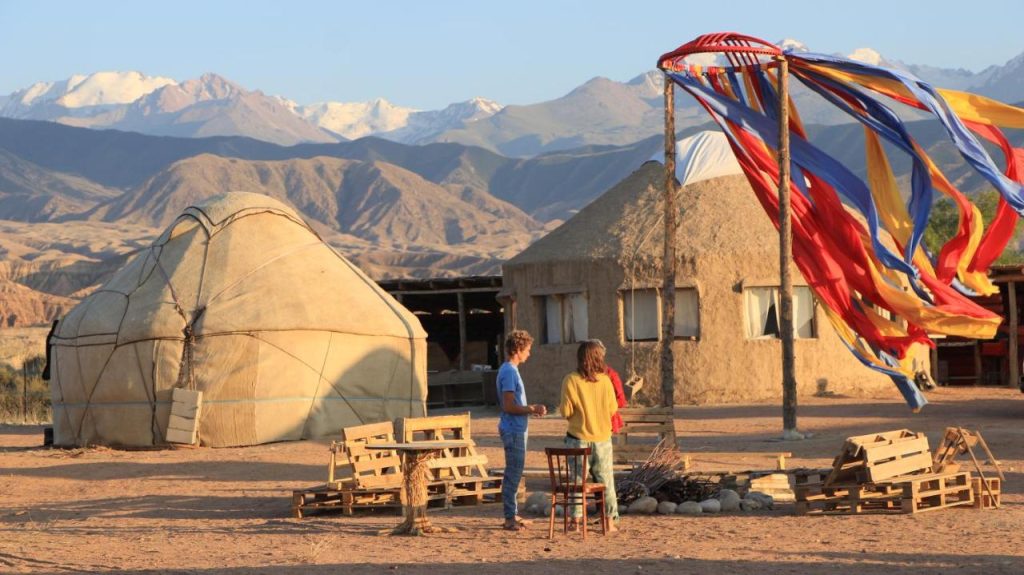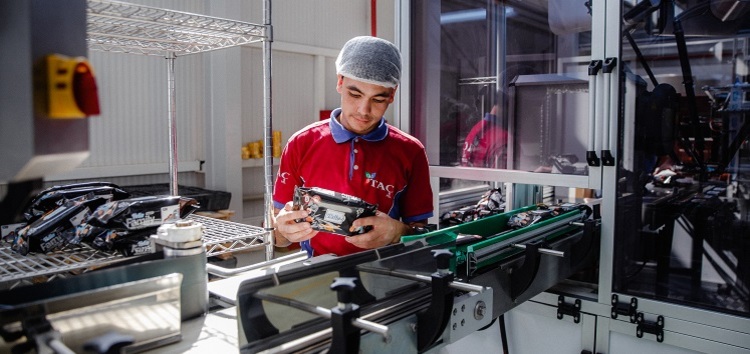Bilguun Batsukh
Known for their picturesque natural beauty and breath-taking mountains, the lands of Central Asia are especially vulnerable to climate change due to their high altitude and dependency on extractive industries.
The EBRD and donors invest comprehensively in Green Economy Transformation in Central Asia, from facilitating policy dialogue, developing legislative frameworks, introducing renewable energy projects, providing capacity-building to SMEs to guide their sustainability initiatives, and providing tailored advisory services to grow their business.
Furthermore, local entrepreneurs have been true champions of the transition to greener operations, and are driving change in not only their businesses but also their communities. Today, we would like to introduce two of their achievements in terms of sustainability.
Empowering eco-tourism in the Kyrgyz Republic
For over 20 years, the Bel-Tam yurt camp has been at the forefront of the tourism sector in the Kyrgyz Republic.
Conscious of its environmental impact and the needs of its clients, Bel-Tam is now moving towards sustainable and energy-efficient operations with support from the EBRD through the Small Business Impact Fund (SBIF)*.
First established in 2000 on a remote mountain by single mother of three, Aida Kydyrgycheva, the Bel-Tam yurt camp has since moved to the shore of Lake Issyk-Kul and become a popular destination among international and domestic tourists with overwhelmingly good reviews on Booking.com and TripAdvisor.
On the picturesque lakeside, Bel-Tam is more than simply a tourist camp. It offers unique cultural experiences showcasing its nomadic heritage, from horse riding, cycling or hiking trails, to culinary classes for traditional Kyrgyz dishes, and instruction in the making of felt and setting up the yurts themselves.
The camp is also known for hosting the annual Hunting Birds Festival and the Kol Fest music festival, which attract hundreds of guests to the area, not only increasing the camp’s profile but also boosting the local economy as more and more guest houses open and local jobs are created.
Challenges from nature and traditional solutions
Since 2011, Bel-Tam has been transitioning to ecotourism with the introduction of the Eco House, featuring solar panels – to power the drinking water pump – as well as the installation of heat pumps for colder months.
Currently, the camp has one large dining yurt for 40 people, and 14 sleeping yurts. However, given the camp’s geographical location, which does not allow for natural water filtration during the summer months and has high groundwater levels, it faced significant challenges in terms of waste management, spending as much as five per cent of company revenue on septic tank pumping services.
“Lake Issyk-Kul is often considered a gem of Kyrgyzstan, the world’s second largest alpine lake. Preserving the natural beauty of its environment is of utmost importance to us. It is our responsibility to protect it,” shares Aida. “Consequently, it’s vital for every business around the lake to have wastewater facilities in place. Being situated so close to the lake, we had long desired to install a water treatment solution, but we lacked the necessary skills.”
Green expertise and modern solutions
Aida’s team have proactively sought to solve this issue by securing a preliminary permit for a wastewater treatment facility on the premises and seeking assistance from EBRD consultants to engineer and support its construction. The comprehensive installation was complemented by essential staff training, along with an instruction manual for ongoing maintenance.
Today, the plant operates efficiently and is monitored through a cutting-edge system accessible via iOS and Android applications. This not only resolves the wastewater issue and reduces operational costs, but also positions Bel-Tam as a more environmentally responsible business.
“The wastewater facility turned out to be more manageable than we had anticipated. We learned that it could be operated remotely, thanks to digital solutions. Moreover, the consultants educated us about various green technologies. Now, we can share this knowledge with our community,” Aida concludes.
Aida remains committed to promoting eco-tourism and setting an example for other businesses in the area to follow. It is clear that Bel-Tam’s future is bright and green.
Tach Hil: expanding and growing sustainably in Turkmenistan
Established in 2015 by Tachmyrat Gurdov, Tach Hil is a leading manufacturer of personal care and cleaning products in Turkmenistan, blending cutting-edge technology with quality raw materials.
Since 2018, the EBRD has been providing long-term support to the company as part of its Blue Ribbon initiative to grow the business sustainably.
Tach Hil has received everything from loans to expand its business operations and build new plants, to tailored marketing, and advisory solutions regarding Environmental, Sustainability and Governance (ESG) commitments. This helped it overcome the global Covid-19 pandemic and move towards a green transition.
Building the business and successfully responding to crisis
Since Tac Hil was founded, business has grown exponentially and allowed it to focus on quality as well as scale, expanding its product lines in response to increasing demand in the market and meeting production criteria including Turkmen trading standards, halal compliance and five ISO certifications.
As the business grew, it became imperative for Tach Hil to prioritise developing a long-term strategic vision, improving its production processes, and building its brand image and marketing strategy.
With support from the European Union, the EBRD advisory team has continuously worked with Tach Hil since 2019, including throughout the Covid-19 pandemic.
As a result, when 70 per cent of all production factories had to close, Tach Hil was able to pivot quickly, introducing liquid soap, dishwashing liquid and antibacterial hand sanitiser to retain production volumes and diversify its range from 32 to 148 products.
“The EBRD helped to inject new capability by bringing in global experts to set up the new factory,” Tachmyrat remarks. “Modern and top-of-the-line factory technology was operationalised smoothly, and high-quality products hit the shelves within days. We quickly moved to the top spot in the consumer market, growing regionally.”
Shifting focus to ESG standards and renewable energy
To maintain its success, Tach Hil continues to look ahead, and recently engaged the EBRD advisory team who appointed ESG advisors to assist with ISO 9001 compliance and the implementation of a quality management system.
Tach Hil is now planning to procure a 12 kWp rooftop solar system and a 5 kWh battery storage to benefit from renewable energy. While electricity prices are relatively low in Turkmenistan, the installation of this green system demonstrates the company’s commitment to the environment within the sector and helps mitigate the risks of future rises in energy tariffs, or the interruption of the electricity supply in the future.
Training and mentoring sessions from the experienced EBRD advisors in ESG continue to help Tach Hil in its growth, while achieving UN sustainable development goals.
Tachmyrat concludes: “We plan to become the leading producer of homecare and laundry, beauty and personal care products in Turkmenistan. With EBRD support, we are able to expand our export markets by offering competitive products.”
A greener frontier in Central Asia
For SMEs across the world, the EBRD provides comprehensive advice and support systems to assist businesses in embracing sustainability and green transition.
For the Bel-Tam yurt camp, green solutions led to compliance with environmental regulations along with cost savings, while Tach Hil has successfully reimagined its business model and expanded its operations through improved ESG reporting and renewable energy solutions in the face of an unexpected crisis.
The journeys of Bel-Tam and Tach Hil demonstrate that the road to sustainability is not the same for all businesses, but collaboration with the EBRD helps to build a better and greener future for SMEs.
*Small Business Impact Fund with support from Ireland, Italy, Japan, Korea, Luxembourg, Norway, Sweden, Switzerland, the TaiwanBusiness – EBRD Technical Cooperation Fund and the United States. ///EBRD, 30 January 2024

